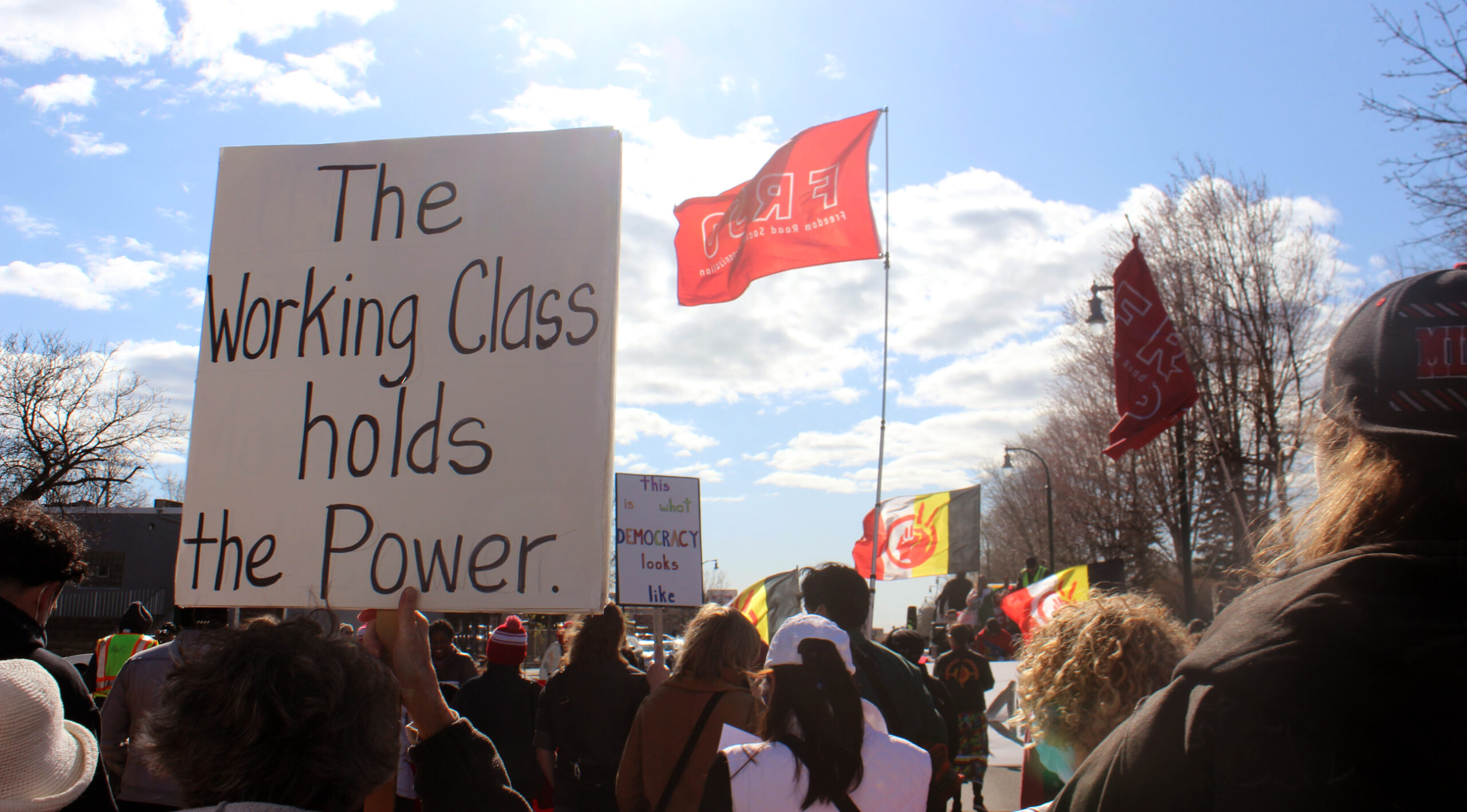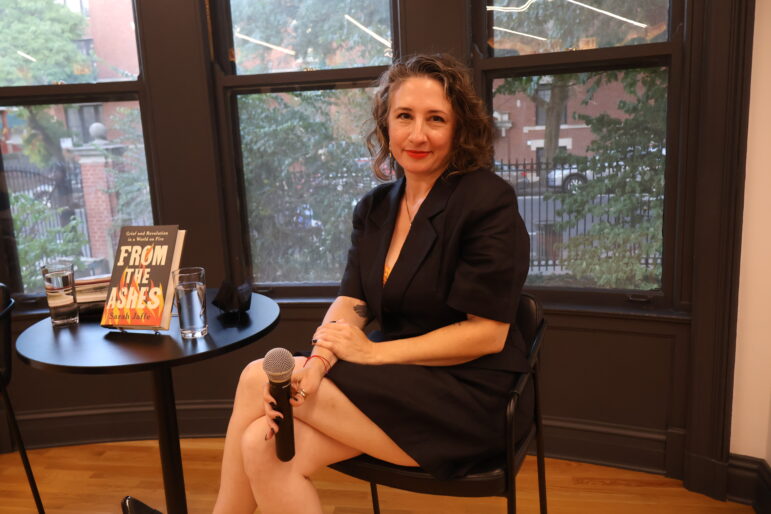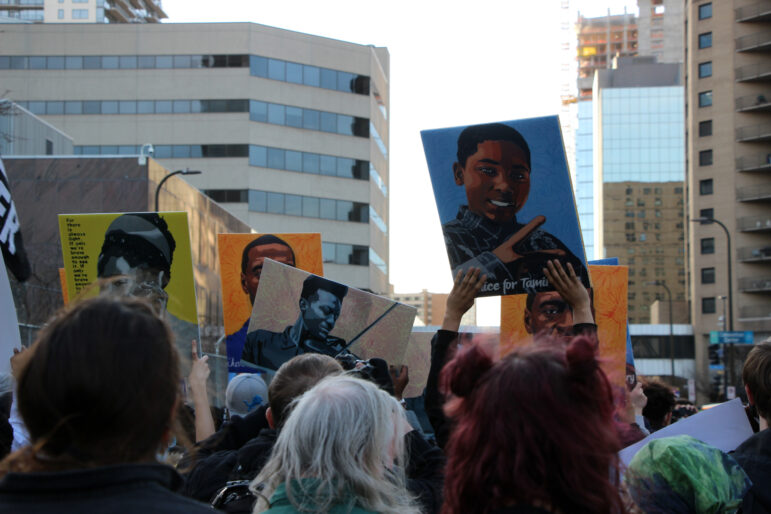
Protestors march through Minneapolis on May Day, March 1, 2021. Photo by Amie Stager.

Share
My dad worked at Best Buy corporate for a long time and was laid off a few years before the pandemic. Then in February 2020, he started working at Home Depot in the garden department. I thought, “Oh, how good for him, he needs to get around and walk and talk to people and learn the other side of retail.”
The emotional landscape of my childhood days were often shaped by what mood he was in when he came home from work. Although his outbursts mellowed as we grew older, I knew that cycle of repression and aggression continued after I left home to go to college in Minneapolis. When I did come home to visit, I listened to his complaints about customers and coworkers, compensation for mileage, and the physical labor of walking around on concrete floors all day (he had to get surgery for a torn meniscus early in 2021).
I remember one exchange, which started with him gawking at news coverage of students protesting in front of the Minnesota state capitol.
“They should be working right now, why are they handing out free water bottles to them with my tax money?” he said. “Ridiculous.”
I fired back, “They’re unemployed right now because of the pandemic. And just because they’re unemployed doesn’t mean they don’t have rights. You didn’t have a job for years and that didn’t mean you didn’t have rights.”
For once, the spark I lit flickered out and we didn’t blow up in an argument.
Over a year and a half later in December 2021, he contracted covid-19 while laboring as an essential worker at Home Depot and died after suffering from a pulmonary embolism. I needed more time with him. I wanted everything to burn.
I don’t blame people for working while they’re sick. I don’t even blame the virus for doing what it came into existence to do. But I do blame the powerful peddlers of disinformation spreading harmful ideas that a vaccine would be worse for you than the disease. My dad, who gave me coupons for flu shots every year, refused to get vaccinated against covid. He had been vaccinated against other diseases from his time in the military, but he was comfortable in his echo chamber of right-wing media narratives that minimized the threat of the disease. I also blame the system that demanded a return to normalcy.
Sarah Jaffe’s new book, From the Ashes: Grief and Revolution in a World on Fire, contains everything that I’ve been thinking about since then while awakening to the grief that is inside me, in all of the people around me, around the world, and in the land and air around us. I’ve also been awakening to the power in that grief.
In this book, organizers share their stories of grief and power in From the Ashes, including several from Minneapolis. The George Floyd uprisings, and the demonstrations of collective grief that have followed police brutality in the U.S., are threaded into a wider story on the history and power of grief. Jaffe carefully threads these stories with her own, alongside criticism of the death-making systems and repressive cultures leading us toward planetary catastrophe and collapse. What results is a poetic call for working-class movements everywhere to gather up our ghosts, of which there are many, and set them free.

Workday Magazine sat down with Jaffe to talk about Minnesota, movement organizing and politics, and what to do with pain. The following interview was edited for clarity.
Workday Magazine: The way you write about love in Work Won’t Love You Back, and the way you write about love in this book, I think are very similar, it’s a sort of evolution. How did the idea for this book come about, and when did you know you had to write it?
Sarah Jaffe: I am always writing about love, aren’t I? Which is very funny to me. I literally wrote the proposal for Work Won’t Love You Back in the weeks after my father died in sort of a mad rush. I was kind of burying my feelings in that book, writing all these emotional journal entries about everything that was going on in my life—my father died and the end of a relationship that was basically a marriage, and somewhere in that process I was like, “Oh, I should write something properly about grief.” It took a couple years to write the proposal, because when I was recovering from Work Won’t Love You Back going out into the world, I would call my agent, and be like, “I’m trying to work on this,” but I’d just end up crying. Obviously, there is no limit to how many feelings one can have. I continue to have all of the feelings about this whole process. I started seeing grief in everything after it happened to me, and there were a couple of moments in that period of time, there was covid, there was the George Floyd uprising, that made the world suddenly start talking about grief.
Workday Magazine: There are the themes—Burn, Flow, Dig, Breathe, Weather—and then you have these breaks that are more of a memoir. How did you come up with the book structure?
Jaffe: The structure came to me fairly early. I knew I was going to have these big thematic chapters. At first, I thought it was just going to be four. I’m going to write about state violence, immigration, deindustrialization, and climate change. And then, covid comes along, and clearly I have to write a chapter about that.
The memoir was the hard thing to figure out. My story is a lot more ordinary than a lot of the people that I’m interviewing. My father died of kidney disease that was on top of every other thing that he had had for years that was smoking related and working-too-much related and men-don’t-know-how-to-take-care-of-themselves related. So it was political in that everything is political. But he was not shot by a cop or drowned trying to reach the British Isles. I can’t just put this in the same place. It has to be somewhere else. It occurred to me that grief sort of hits you in these moments when you least expect it, it does well up in between things and sneak up on you.
Workday Magazine: I love the memoir and the self examination that is woven into this world examination as well. There’s so many dots that you connect in this book, from the violence of borders to the push for renewable energy to surviving disasters. Was there anything that you wanted to write about that didn’t make it into the book?
Jaffe: There are some things that we cut that we liked. I notably had to save the Minnesota stuff. And the horrific experience of finishing the book on September 15 and then October 7 happened. The little bit that I had written about Palestine, because there was a section on it before, got ripped out. So I had to tear a big chunk out of it and write 5,000 words in a rage haze about my reaction and all of the organizing going on around the genocide that is still now ongoing, and it is almost a year. I had a section on Jordan Neely, the man who was killed on the New York City subway by a former Marine, and some other stuff about sort of photography and the dead.
Workday Magazine: You talk to a lot of people from Minnesota in this book, and you recently wrote about the Minnesota Model of organizing. What’s your reaction to Minnesota’s Governor Walz being selected as vice president Harris’s running mate?
Jaffe: Tim Walz has this reputation that was made for him by a bunch of organizers, and people should remember that. I think he’s done a good job as governor. But I think it’s really, really important that people know that all of the great stuff that’s happened in Minnesota came about because people have been organizing and busting their asses and building this incredible coalition on the ground that works together even when it’s hard and messy.
That work has been something I’ve been following since 2011. I met people from Occupy Homes Minnesota at Netroots Nation in 2011. And somewhere along the line, Steven Lerner introduced me to Javier Morillo who was at SEIU Local 26 at the time, and CTUL, I don’t even remember when I first talked to them. Shout out to Josh Keller at SEIU, who is the best union press guy in the business. I feel very invested in Minnesota despite having never lived there.

Workday Magazine: This book is largely about the failure to collectively acknowledge the losses we face. But there are so many stories of people in the book who are acknowledging their losses as well as collective loss. I imagine this book is going to open people up to talking about it more and more.
Jaffe: So many people have a story that we’re not sharing and we’re not talking about publicly, not even with close friends. We do things alone, and I am super guilty of that. I’ve been trying very unevenly to get better at talking about things. It’s really hard to insist on the space to talk about it when it can often really seem like nobody wants to talk about it when the world says “go back to work, go back to normal, everything’s fine.” I tell a bunch of stories in the covid chapter, but you know, particularly these two women who lost their fathers. Cristina lost her father in that first awful wave in Italy. Kristin lost her father when politicians said, “everything’s fine, open up.” It was a political fight, right? He did not want to listen to her. It reminded me so much of my relationship with my own father. Both of them got really involved with political organizing in different ways.
Workday Magazine: This book is just as much about the physical places we go, as much as the emotional places. You show how you do that, the deep places that you go for yourself. I graduated with a journalism degree in spring 2021, and I was writing about essential workers, and I had these moments of, “Oh my gosh, there’s so much that needs to change in this field.” Why are journalists not expected to have feelings about what they write about?
Jaffe: Not only expected to not have feelings, but if you do, you are penalized. It’s also gendered, too. There’s a bit in the covid chapter where Francesca Nava is talking about this. She’s an investigative journalist, and she’s like, “I am supposed to be cool and collected and be an investigative journalist. But my cousin died of this, this touched my family. And there is anger, because politicians fucked it.” How are we supposed to maintain motivation to keep doing the work but not have any feelings about it? How are we supposed to never learn anything? They want you to be a subject matter expert. They want you to be a beat reporter. But if you have any opinions about it, then you are relegated to the opinion section. My opinions about the labor movement in America are informed by 15 years of reporting and research. A certain reaction that I’m expecting to this book will just be like, “Oh well, she’s just having a bunch of feelings and this isn’t really political.” People have already said stuff like that to me and I find it depressing. I find it frustrating. I think it misses the point of why we do any of this stuff. I mean, both journalism and political organizing. Why would I be a labor reporter if I did not think that people’s conditions in the workplace and their feelings about those conditions matter? Why would you do any of this if you don’t care?
People who are like, “Oh, I’m a socialist, I’m a Marxist. But I don’t think talking about feelings is materialist enough.” It’s like, my dudes, did you actually read Marx and Engels? The point was to make people less miserable. The point was that organizing the world this way creates a massive amount of human misery, death, destruction.
I returned to this over and over again, something that Jess Kuttner said to me, one of the therapists that I spoke to for the book. She was like, “Jewish teaching says that every life is a whole world. So if you save a life, you save a whole world. And when we lose a life, we lose a whole world.” That’s why I write about the things I write about, which aren’t always death.
Workday Magazine: Cristina in the book talks about surviving covid, and how we are all survivors. Capitalism is dying, and I feel like there are other books we can put yours in conversation with, other arguments for changing how we respond to crisis. Like Hospicing Modernity by Vanessa Machado de Oliveria or adrienne maree brown’s Emergent Strategy. I wonder what would it look like to have a funeral for capitalism, what would collective mourning of it look like?
Jaffe: A few different people say a different version of this in the book, that it feels like if we start admitting everything, we will never stop. I felt like that a few times this summer. I recorded the audiobook, and I spent several days in the studio reading it out loud. At first I was doing fine. And then the last day, I was in bed by 9:30, I was so wrecked, and I was quite depressed for a few weeks afterwards. I’ve been trying to think of, how am I going to take care of myself when I have to talk about this book? Because it really can feel overwhelming, and we as a society sort of don’t deal with overwhelming we shove it down.
We drug it, we ignore it. We play games on our phones and watch very bad TV, or sometimes very good TV. We numb it in so many ways, and it’s been interesting to think about sort of dealing with it. You mentioned adrienne maree brown, and she’s one of many people who talk about trauma and how this affects our politics and how this affects our organizing. Grief and trauma were things that a lot of the people that I was talking to had been thinking about in their organizing. One of the conversations I kept having with folks from Minneapolis after the George Floyd uprising, after the referendum didn’t succeed in abolishing the Minneapolis police, everybody asked, “What do we need? What do we need to build so that we can abolish the police?”
It’s been one of my favorite things about talking to everybody there is to know about all the things that are being built to actually construct a world where we don’t need cops, a world where we don’t need wage labor, a world where we are not all in so much pain, because we’re actually dealing with it when it happens, and we’re not afraid of it.
How do we turn our pain into something else? We all need to be held, and witnessed, and seen and cared for while we’re having it. How to build that into organizing is an interesting question that I do not have all the answers to.
Workday Magazine: Who is building the next world, the world that is being born right now, while capitalism is dying? I think it’s the people in this book.
Jaffe: I think the point of this kind of journalism is just to show people that, not only is there something that you can do, but here are the people who are doing it, and it’s hard and it’s exhausting. People in this book, more than anything I’ve ever written, talk really honestly about being burned out and losing their faith and needing time off.
Nobody is really thinking that everything’s great these days. Whether they are literally trying to set a hotel on fire or trying to set a police station on fire—one of these things is not like the other. People are trying to burn it all down all the time. Some of them have misplaced the targets of their anger.
I don’t get to fascism until the end of the book. Fascism is: not only can we not grieve, but we actively take pleasure in other people’s losses and deaths. That’s what it offers you. Doesn’t really offer you that things will get better. It just offers you a really twisted form of joy. We can do better than that.

